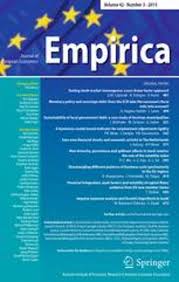
Has the Euro Increased International Price Elasticities?
This paper analyzes the role of common data problems when identifying structural breaks in small samples. Most notably, we survey small sample properties of the most commonly applied endogenous break tests developed by Brown, Durbin, and Evans (1975) and Zeileis (2004), Nyblom (1989) and Hansen (1992), and Andrews, Lee, and Ploberger (1996). Power and size properties are derived using Monte Carlo simulations. Results emphasize that mostly the CUSUM type tests are affected by the presence of heteroscedasticity, whereas the individual parameter Nyblom test and AvgLM test are proved to be highly robust. However, each test is significantly affected by leptokurtosis. Contrarily to other tests, where skewness is far more problematic than kurtosis, it has no additional effect for any of the endogenous break tests we analyze. Concerning overall robustness the Nyblom test performs best, while being almost on par to more recently developed tests in terms of power.





